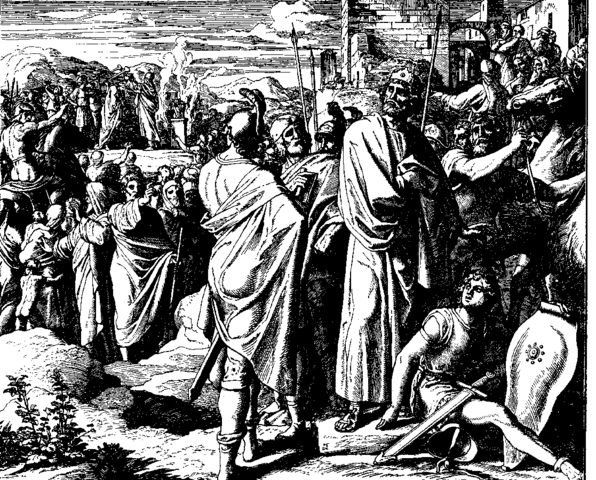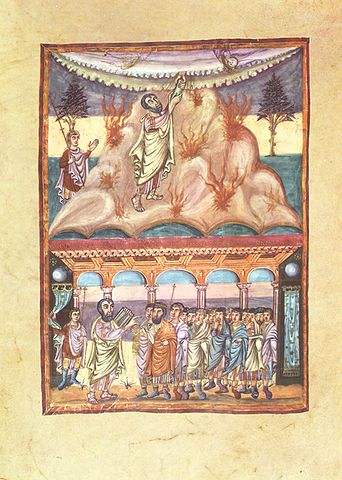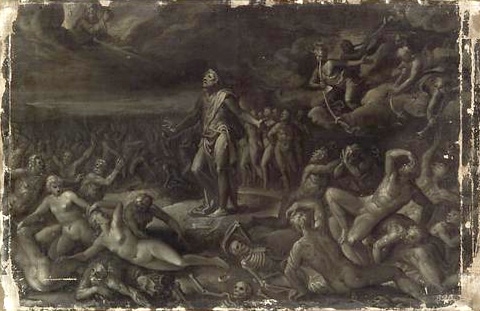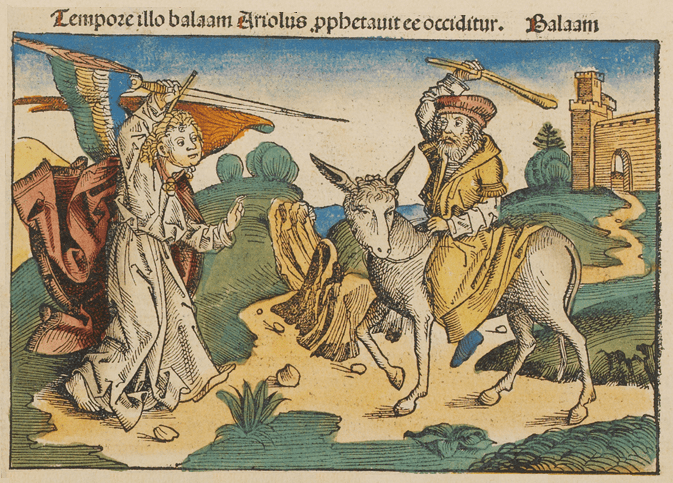Christianity is among the most widespread religions in the world, inspiring many people to adhere to beliefs that guide them through their daily lives. The majority of the religion is based on the Bible, a sacred Abrahamic text that illustrates the teachings of the prophet Jesus of Nazareth. The Bible is divided into the Old Testament and the New Testament, and many of its books go into a great deal of detail concerning the religion’s history.
So, just how long can the longest books of the Bible get? Today we’ll take a look at the 10 longest books in the Bible according to how many chapters are in each one!
-
2 Chronicles
Preceding Book: 1 Chronicles
Number of Chapters: 36
Important Figure: Adam
 Source: wikimedia.org
Source: wikimedia.org
The book of 2 Chronicles was compiled by a Jewish scholar from an array of historical texts. 2 Chronicles covers the time period starting with King Solomon’s ascent to the throne and concluding with the exile of the southern kingdom of Judah. The book focuses on the political changes taking place in Judah and mentions several secular historical figures as well.
Did you know?
In the Septuagint, a second and third-century Greek translation, the book of 2 Chronicles is actually divided into two parts based on the reigns of David and Solomon.
-
Deuteronomy
Preceding Book: Numbers
Number of Chapters: 34
Important Figure: Joshua
 Source: wikimedia.org
Source: wikimedia.org
The title “Deuteronomy” stems from Greek roots and refers to “copy” or “repetition” of the laws. This title is especially fitting, since Deuteronomy is present in the form of Moses reiterating the commandments in preparation for his people’s entry to the Promised Land of Canaan! While the book is written as if from Moses’ perspective, most historians and scholars conclude that the book of Deuteronomy was actually written much later–sometime during the 7th century after King Josiah’s religious reforms.
Did you know?
The laws put forth in the Deuteronomy are usually organized into categories such as civil law, criminal law, and laws of religious observance.
-
Luke
Preceding Book: Mark
Number of Chapters: 24
Important Figure: Jesus
 Source: wikimedia.org
Source: wikimedia.org
Luke is the third and longest out of the four Gospels, and is the longest book in the New Testament as well. Luke associated closely with Apostle Paul and is believed to have written the book of Acts in addition to his own gospel. The Gospel of Luke details a variety of key events in Jesus’ life, including his journey into the desert, his miraculous healings, and his eventual death and resurrection.
Did you know?
Luke was a doctor and is likely to have been very well-educated.
-
Exodus
Preceding Book: Genesis
Number of Chapters: 40
Important Figure: Moses
 Source: wikimedia.org
Source: wikimedia.org
Exodus, the title of which is derived from the word for “exit,” tells the story of the Isrealites’ delivery from slavery in Egypt and resulting freedom. It is said to be one of the most core books in the entire Bible when it comes to the identity of Israel, since past hardships are repeatedly mentioned in later books. Many fundamentalists believe that Moses was the author of this book, but scholars disagree.
Did you know?
The Hebrew name for this book is quite different: It is called “Shamot,” which means “names.”
-
Ezekiel
Preceding Book: Lamentations
Number of Chapters: 48
Important Figure: King Jehoiachin
 Source: wikimedia.org
Source: wikimedia.org
The book of Ezekiel plays an interesting part in Christian theology since it places more emphasis on individual responsibility to God. While other books, such as Deuteronomy, stress that the people of Israel share one another’s culpability as a whole nation, Ezekiel suggests that each person’s level of guilt differs according to their own actions. The book also describes the glory of a future, holy kingdom.
Did you know?
While other biblical authors mention Israel in reference to more precise historic periods, Ezekiel is known for referring to a more comprehensive Israel that includes its past, present, and future.
-
Numbers
Preceding Book: Leviticus
Number of Chapters: 36
Important Figure: Moses
 Source: wikimedia.org
Source: wikimedia.org
The Hebrew name for the book of Numbers, Bemidbar, means “In the Wilderness.” Numbers opens with the Israelites preparing to march forth and take the Promised Land after having received their holy commandments. This book is often cited as an example of God’s mercilessness towards disobedience since he killed around 15,000 soldiers for questioning Moses and Aaron’s leadership and the hardships they were forced to endure.
Did you know?
Numbers is sometimes also called The Fourth Book of Moses.
-
Isaiah
Preceding Book: Song of Songs
Number of Chapters: 66
Important Figure: Prophet Isaiah
 Source: wikimedia.org
Source: wikimedia.org
The book of Isaiah talks about a day of judgment when all nations will come to the city of Zion for sanctuary, as well as the need for Zion to be purged of all evil. The prophet Isaiah was referring to the Assyrian expansion, which he said was a warning from God. In first person, Isaiah also describes a vision in which he saw God and offered up his services and faithfulness.
Did you know?
The book of Isaiah states that God will return exiles who redeem themselves to Jerusalem.
-
Jeremiah
Preceding Book: Isaiah
Number of Chapters: 52
Important Figure: Baruch
 Source: wikimedia.org
Source: wikimedia.org
Many people say that the prophet Jeremiah’s writing feels the most human since it shows him ruminating and confiding in Baruch, his scribe and close friend. The book goes into the difficulties and struggles of exile, stating that nothing good will befall people who fail to remain faithful and follow the Christian religion. Jeremiah also tells of his personal struggles, which is unusual.
Did you know?
The details that Jeremiah provides regarding his personal life make his stories easier to investigate than most in the Bible.
-
Genesis
Preceding Book: None
Number of Chapters: 50
Important Figure: Abraham
 Source: wikimedia.org
Source: wikimedia.org
Genesis is the first book in the Bible, and it tells the story of the Christian creation myth and the origins of the Jewish people. It is often divided into the primeval history and ancestral history, which each address their respective parts of the creation and origin story. Genesis includes classic stories such as the Tower of Babel, Adam and Eve, and Cain and Abel.
Did you know?
The Hebrew title of this book is “Bereshit,” or “In the Beginning,” which is the opening line of the first chapter.
-
Psalms
Preceding Book: Job
Number of Chapters: 150
Important Figure: King David
 Source: wikimedia.org
Source: wikimedia.org
Psalms is the longest book in the Bible according to the number of verses. This book is actually an anthology comprised of many different songs, most of which feature parallelism as a defining feature in their structure. Some of the songs are clearly labeled as having been written by distinct figures, such as Moses and Solomon. Little or nothing is known about the authors of the other psalms in the book.
Did you know?
Proverbs and Psalms are the only two composite books in the Bible.
